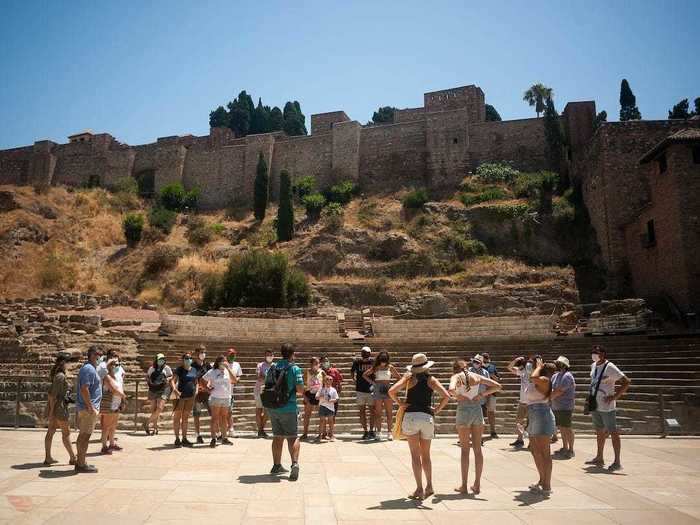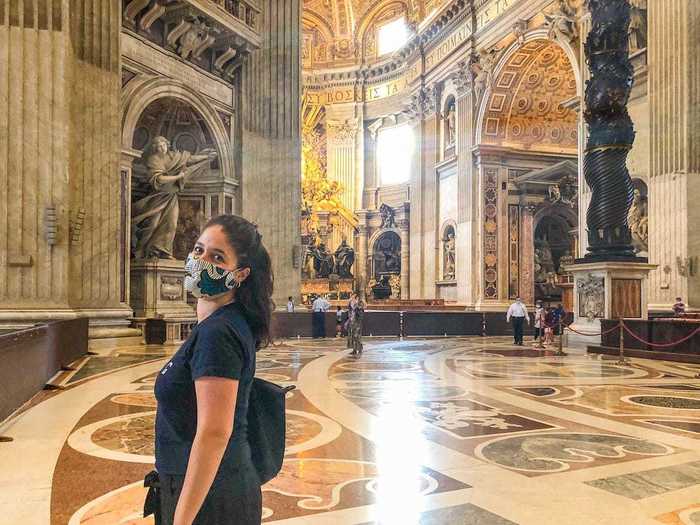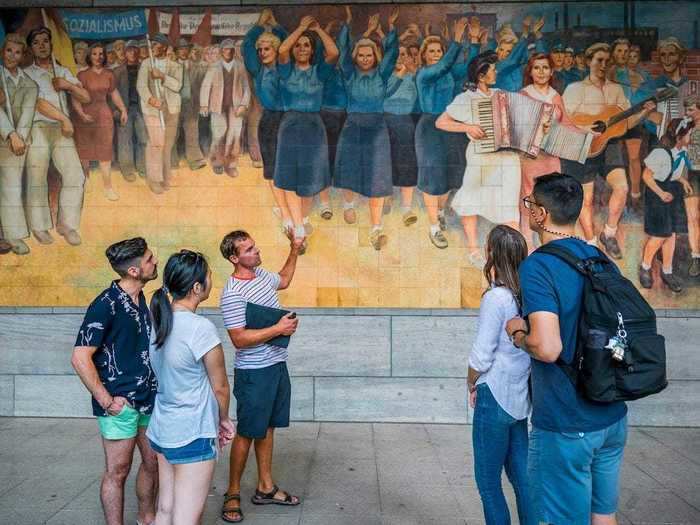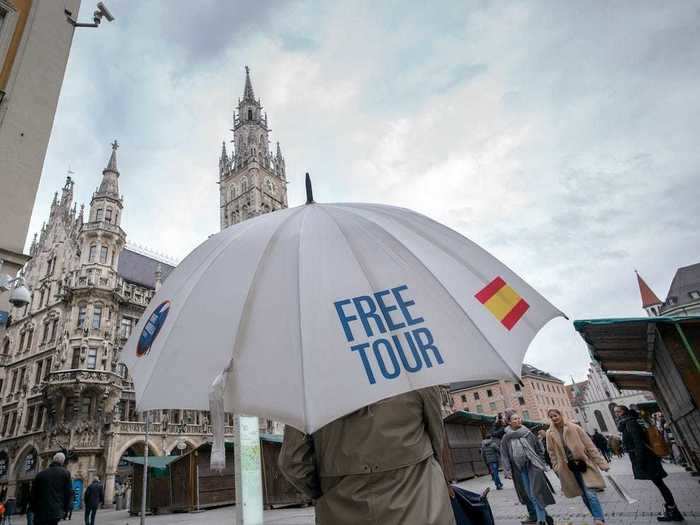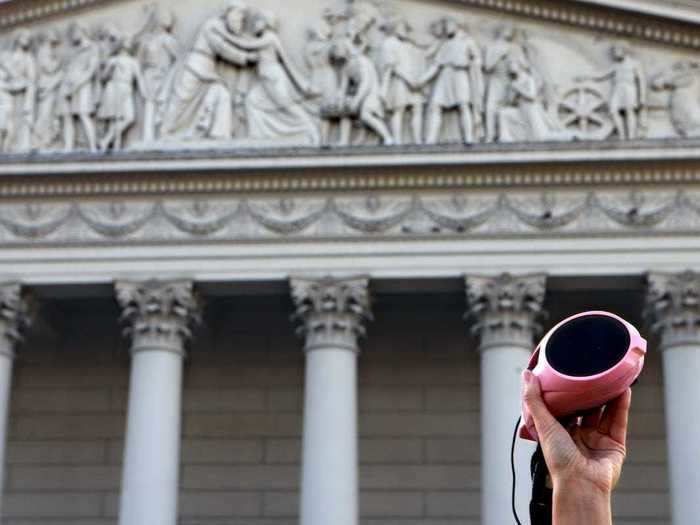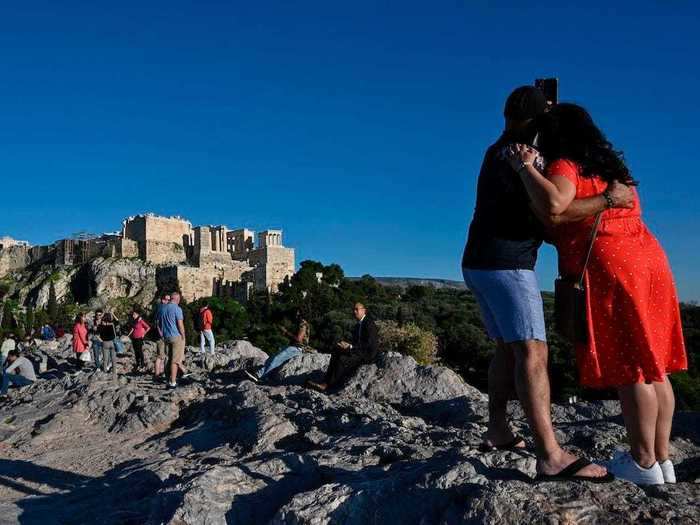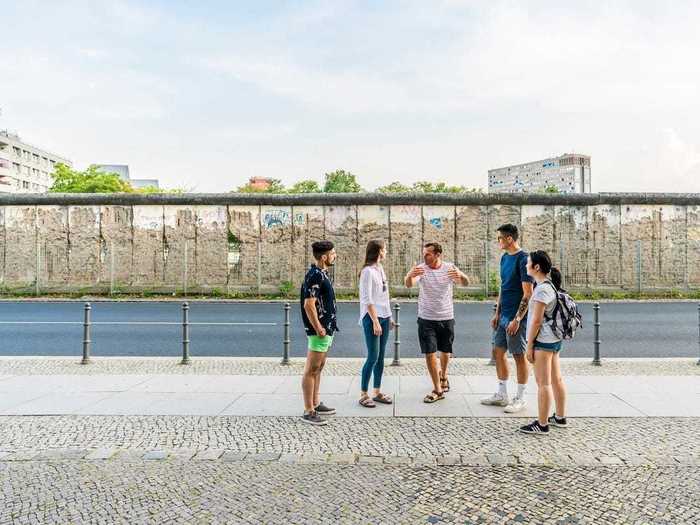A tour of a vineyard in Champagne, France.Andia/Universal Images Group/Getty Images - As domestic and international travel slowly resumes, tour guides are getting to share their countries with visitors again.
- While some guides say they're eager to welcome tourists, they say they've noticed clients making a few mistakes during this time.
- Insider spoke with tour guides who said some travelers are handing their phone to strangers or not buying tickets in advance.
- Others, they say, are forgetting to wear a mask or follow social distancing.
Some of the most popular destinations in the world are deserted thanks to the coronavirus. The Trevi Fountain in Italy no longer has swarms of tourists throwing coins into the water and the Blue Lagoon in Iceland is eerily quiet.
As countries reopen for both domestic and international travel, some tourists are taking advantage of these emptier attractions — and many are joining tour guides to gain insight into a location's history, culture, and tradition.
Insider spoke to a handful of tour guides, and while many say they're thrilled to welcome visitors again, they say they've spotted clients making some mistakes during this time.
From forgetting to wear a mask to ignoring social-distancing guidelines, here's what some travelers are getting wrong, according to tour guides.
Editor's note: The Centers for Disease Control and Prevention (CDC) recommends avoiding all nonessential international travel during this time. If you decide to travel, follow the CDC's recommendations in the Global COVID-19 Pandemic Notice.
Tourists should know how the destination is handling the coronavirus before they visit, and be comfortable with the size of the tour group, guides say.
Countries and cities around the world are managing the situation differently. And as such, tour companies have different rules — so it's important that travelers have an understanding of what's expected of them when arriving in a new place.
"You should understand where you are going and what their coronavirus experience was like," Jan Katzmarczyk, a Berlin tour guide for tour operator and travel agency GetYourGuide, told Insider.
The tour guides Insider spoke with recommend that prospective visitors research their destination, and find answers to questions like: Are masks required in outdoor or indoor spaces? Are attractions open? Have restaurants and businesses reopened? Does the city have a curfew? Will you be able to take public transportation?
Guides say travelers should also commit to following a company's rules and make sure they're comfortable with the size of their tour group ahead of time.
Zuzana Kaniokova, a manager for GetYourGuide, said that on any tour, people should get to know the guide and fellow travelers.
"Let other participants know where you're from, how long you've been traveling, and what you're looking forward to," Kaniokova told Insider. "Not only will this promote feelings of positivity and mutual respect, you'll also help the guide break the ice and be able to better manage the various personalities of the group to keep everyone safe."
The guides stressed being flexible. Not all tourists realize that some attractions are still closed, while others have time caps.
A tour of Castel del Monte near Andria, Italy.
Davide Pischettola/NurPhoto/Getty Images
Angelo Carotenuto, the founder and co-owner of LivTours, a tour company operating out of Italy, Paris, and Barcelona, shared how rules are constantly changing.
Within 24 hours, the Academia Museum in Florence, Italy, changed its policy from allowing two tourists per group to groups of six people, he said.
"Things change on a constant basis," he told Insider. "A little bit of flexibility is what we're expecting clients."
Beyond adaptability, travelers should also recognize their experience might be slightly different during this time.
Franco Assorgi, who has given tours across Italy for more than 30 years, is currently taking tourists throughout Rome, Italy, with The Tour Guy tours. He'll take clients to iconic destinations, like the Vatican City or the Colosseum.
Before, crowds of people would file into the cramped spaces, and tourists were often allowed to explore without time constraints. But now, Assorgi says he rushes through a tour of the Colosseum as tourists only get 40 minutes inside.
Assorgi says he's also uses a tablet more to pull up pictures, maps, and historic documents to tell stories that he no longer has time to share inside the attraction.
But not all changes are bad; Assorgi said it's nice to tour places without crowds.
The guides said sometimes tourists forget to wear their masks and maintain 6 feet apart.
A tourist wears a mask in the deserted Vatican Museum.
GetYourGuide
Masks have become a common sight and requirement for many people around the world because they're an effective way to slow the spread of the coronavirus.
Assorgi said a majority of his clients have all been willing to wear masks.
"But sometimes, especially with young people, they forget," he told Insider. "It happens to me, too."
While wearing a mask is not required in every country, Assorgi said that it's important to keep a mask on during a tour and wear it properly, so it covers both your mouth and nose. A few tour guides also suggested carrying an extra mask in case one gets lost or wet.
Others said they've seen some tourists forget to maintain a 6-feet distance from others.
"Social distancing is the biggest challenge for us," Bruno Gomes, the owner of We Hate Tourism Tours, a tourism company that pairs tourists with locals in Portugal, told Insider.
The tour guides said tourists should stop waiting to buy tickets in person.
Each city's rules are different, and some countries don't require masks in outdoor spaces.
GetYourGuide
Gomes said buying tickets in advance means tour groups can avoid queues at attractions.
And with a ticket in hand, not only are tourists saving time; they're also avoiding unnecessary contact with ticket operators.
Tour guides said tipping is still encouraged — just not with cash.
"As with anything changing hands these days, I'm very mindful of touching cash," Katzmarczyk said. "I need to be more diligent about disinfecting at the end of a tour, as guests who want to tip me don't always consider that germs can travel on cash and coins — even if they've been great about following the other rules."
"Platforms like PayPal can be a great substitute. Be sure to set it up beforehand, and ask your guide if he or she can accept a tip digitally, rather than the old fashioned way," he added. "It's safer, and these days, safety is the best way to show appreciation."
Gomes said his company has also reconsidered tipping. Instead of tipping in cash, his tour guides are encouraging guests to purchase a shirt or souvenir from the tour company's online shop.
Tourists should stop handing their phone to strangers.
A tourist uses a selfie stick in lavender fields in France.
Marcos del Mazo/LightRocket/Getty Images
Discovering a new destination often involves a lot of photographs. Tourists should still feel free to snap away, but they should be wary of handing their phones to strangers, tour guides say.
"We see phones and cameras being passed between guests when they are taking pictures for other groups. Sharing phones with strangers is a risky behavior," Stína Bang, a guide for GetYourGuide Originals Golden Circle tour in Iceland, said.
For now, tourists should either stick to selfies or ask a family member to take their picture.
Some tourists aren't bringing personal headphones or downloading apps before the tour, the guides said.
A tour guide holds a speaker for a tour group in Buenos Aires, Argentina.
David Silverman/Getty Images
Entering famous art museums, castles, or tourist attractions, tourists often receive a public headset. But shared headsets will likely be a thing of the past, as some tour companies are now designing apps that tourists can download and use from their own devices.
LivTours is currently building an app that would allow tourists to hear their guide from their personal headphones.
"You don't know where the headphone's been and you don't know if the headphones have been sanitized," Carotenuto said of company-owned headsets.
Carotenuto added that audio guides could become even more important now that people are social distancing. Groups are spread out, so apps allow tourists to be as far away as they desire without straining to hear their guide.
"In our era of streamable content, the audio guide is finally making a much-needed transition: away from those old devices and into the smartphones in our own pockets," says Philipp Krautenbacher, GetYourGuide's director of attractions.
He advised tourists to check whether a cultural site already has an app or see if the tour company has an app. Since many tourists lack access to data when traveling internationally, he suggested downloading the apps from a hostel or hotel when people have Wi-Fi.
Others are needing to use a restroom before, during, or after a tour.
Tourists take a photo at the Acropolis in Athens, Greece.
LOUISA GOULIAMAKI/AFP/Getty Images
Restaurants, bars, and stores have closed many of their restrooms for sanitary reasons, and public restrooms create more touchpoints where people could risk contracting the coronavirus.
"With many businesses in touristic areas much more conscious about who comes through the door, it's harder than ever to find public bathrooms," Katzmarczyk said. "And even the cleanest public restrooms should be avoided if possible these days — that's just common sense."
The safest place to go? At your home, hotel, or hostel. Those spaces are being used by fewer people and are likely cleaned more often.
Finally, some guides said they've seen a lack of engagement — but this doesn't have to be the case.
A pit stop along a walking tour of Berlin, Germany.
GetYourGuide
Masks and 6 feet of distance have created two physical barriers from connecting with tour guides and fellow tourists.
But the guides Insider spoke with shared that those personal connections are why they do their job.
"I really miss smiling at our guests. But we do our best to express that smile with our eyes and through our voices," Chiara Rowley, a GetYourGuide guide for Iceland's Golden Circle said.
"Use your eyes to show the guide you're present for the journey, and use your hands to indicate you want to ask a question," she added. "And when you do, speak up just a little louder than you normally would."

